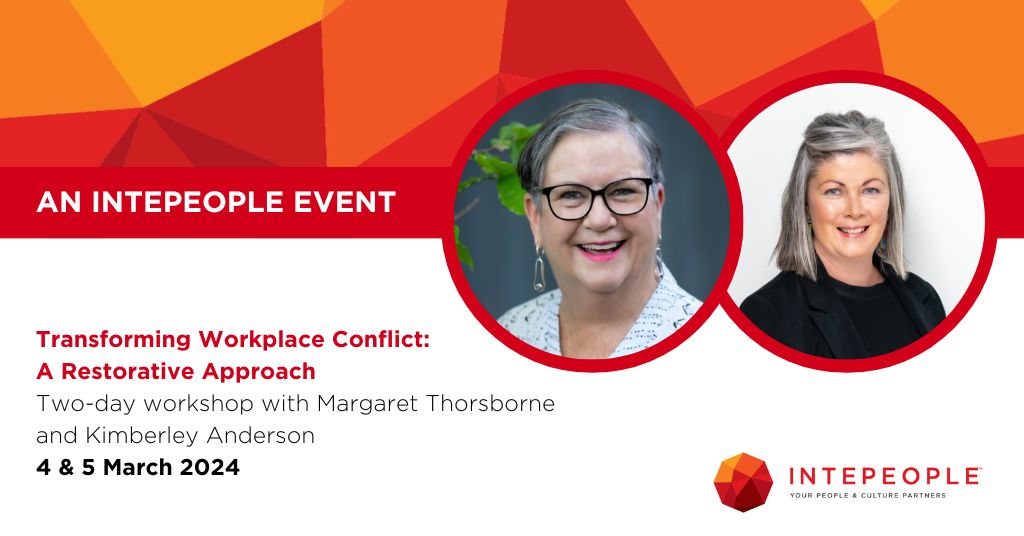
Join us for Transforming Workplace Conflict: A Restorative Approach, a two-day workshop led by guest speaker Margaret Thorsborne and co-facilitated by Intepeople's Kimberley Anderson.
The workshop also provides a networking opportunity for participants.
Date: Monday 4th and Tuesday 5th March 2024
Time: 9:00am start, 4:00pm finish (applies to both days)
Venue: Intepeople, Whitby House, 7 Alma Street, Buxton Square, Nelson 7010
Cost: Early bird tickets are available until Wednesday 31st January 2024 and cost $1,500+GST. From Thursday 1st February 2024 tickets cost $1,750+GST.
Inclusions: Coffee, morning tea, lunch, and afternoon tea will be provided. Please specify any dietary requirements when booking your ticket.
____
Questions regarding the event can be directed to eve@intepeople.co.nz.
Photo: Supplied by Proper Crisps
In 2020, we ran a series of local leadership blogs with a focus on Leading Through COVID-19 That series was designed to inspire and support a sense of togetherness as the region moved through the initial brunt of that challenge.
Now a little over a year on, we are taking the opportunity to reflect back on some of those interviews and revisit some of our local leaders and organisations. We're interested in finding out what's changed, what their outlooks are, and what's gone back to 'normal'.
In this interview, we chat with Andy Leonard, CEO of Proper Crisps. We last interviewed Andy in April 2020, when Proper Crisps were facing changes in demand, managing physical distancing guidelines in their factory and ensuring their production team felt appreciated and respected whilst other parts of the business were working from home.
Let's see what difference a year makes...
Logistics challenges have worsened since we last spoke, both inbound and outbound shipping capacity constraints as well as significant cost increases. These challenges look likely to remain well into 2022.
Consumer buying patterns are trending in a similar way to COVID times, for example online continues to grow. Consumers remain prepared to spend on a "permissible treat”.
The absence of lockdowns has significantly improved team cohesion.
Logistics challenges have probably been the biggest change, which flows through to reviewing supply chain planning, inventory levels, storage facilities, staffing requirements, etc. It has forced us to plan further ahead than ever before. The significance and long period of the supply chain challenges have been unexpected.
COVID has certainly led to a more thorough review and assessment of factory automation options, predominantly due to labour challenges. A small volume of offshore manufacturing is being considered to reduce supply chain challenges.
COVID has confirmed the value of people interacting face to face. Staff satisfaction has been higher working from the office than home, as well as increasing team morale for our superb production people when the whole team is on-site.
Knowing that technology is there as an effective backup is comforting. COVID lockdowns certainly forced a trial run and ironing out all those systems.
Wellbeing and staying healthy has been at the forefront of everyone’s mind, i.e. staff sickness has a different lens than previously.
Cost increases are rampant currently. Managing those costs and maximising the value of our product will be key over the next 6-12 months. Staff retention will be crucial when borders re-open as young people consider potential OE travel.
Quality New Zealand food will be in high demand worldwide, with strong consumer demand for premium food products continuing here in New Zealand. The snack food trend of “less, but better for me” will grow further.
Improved logistics and travel options will result in getting the product to world markets faster and more efficiently….we hope!
And in a fast-growing company with increased complexities, managing burnout in people will be super important.
Enjoyed this interview? Read more from our COVID-19: One Year On interview series here.
In 2020, we ran a series of local leadership blogs with a focus on Leading Through COVID-19. That series was designed to inspire and support a sense of togetherness as the region moved through the initial brunt of that challenge.
Now a little over a year on, we are taking the opportunity to reflect back on some of those interviews and revisit some of our local leaders and organisations. We're interested in finding out what's changed, what their outlooks are, and what's gone back to 'normal'.
In this interview, we talk to David Johnston, General Manager, Te Rūnanga o Ngāti Kuia. When we interviewed David last year, he shared some challenges Ngāti Kuia were facing around supporting staff and their whānau. He also spoke about the benefits of a collaborative approach across all iwi of Te Tauihu (Top of the South), as well as relationships across iwi, government, and community organisations.
What difference does a year make?
Tēnā rā tātou katoa e ngā whānau whānui o te Tauihu o te waka ā Māui.
He moana pukepuke e ekengia e te waka
A choppy sea can be navigated by a waka
How our world has changed in the last 12 months. Although we have come through this relatively well compared to what has happened globally, my mind and thoughts turn to India and other countries that are still being severely impacted.
In terms of Te Tauihu, I am heartened by the collective efforts and continued collaboration across our iwi, government, councils, businesses and communities.
Iwi in Te Tauihu have set up a collective entity Te Kotahi o Te Tauihu Charitable Trust which is led by the CEOs and GMs of each Iwi entity. Our respective Iwi chairs have given us the challenge of working together with others to create the best conditions for whānau to thrive. This includes:
This is just one example of kotahitanga (working collectively) that we are seeing in Te Tauihu.
There have been no real surprises in terms of how we do things as a result of the pandemic. If anything, Iwi type organisations are well placed given our operating models and focus across multiple measures. Where cultural, people and environmental measures are just as important as economic.
Twelve months on, we are even more focused and determined. There is a sense of urgency to help whānau and to work with others in a way we weren’t before. Navigating our new way of working and keeping to a plan has been both rewarding and challenging, especially trying to keep ahead of everything.
As an example, our Iwi completed a significant Hauora (Wellbeing) research project that was officially launched at Te Hora Marae on 22 May 2021. This report sought to investigate the underlying reasons for disparities and inequities in Hauora for whānau. This research will now help guide us as to which areas to focus on to support the wellbeing of whānau.
Ngāti Kuia was already looking at new opportunities and business innovation prior to the pandemic. Covid has just delayed this from happening however we are now moving at speed.
We will be opening a new Kānuka Processing Facility in July at Titiraukawa, our centre of excellence. In this facility, we will process kānuka sustainably harvested from whānau lands using the best of traditional and contemporary methods.
Our earlier trials of kānuka related products have gone well. We will be looking at exporting products once the facility is fully operational.
We are also focusing on pursuits that are best for our whenua and environment which includes organic practices and identifying the health benefits in everything that we do.
Many whānau who live outside of the rohe just want to come home. For this, they need jobs and somewhere to live.
Ngāti Kuia has grown quickly in the last 12 months.
As part of this, we have recently taken on 15 students who have 2 days paid work experience, and 2 days training per week over 12 months. This is part of developing our tribal economy and providing training and jobs for whānau. Students will complete a level 3 Horticulture qualification via NMIT. In turn, this will help establish an organic native research plantation and learning space with mātauranga Māori at the centre of this initiative.
Across all sectors, I have noticed that everyone seems to be very busy. Whilst the opposite of this is not ideal I’m hoping that we are all working on the right things and not heading to burnout.
I hope we all have learnt lessons from Covid including being present and appreciating each other more. In our day-to-day at the office, we are more proactive managing annual leave, quite flexible with sick and whānau leave, and operate with a high trust model.
Waiho i te toipoto, kaua i te toiroa
Let us keep close together, not wide apart
This whakataukī speaks to the importance of keeping connected, and of maintaining relationships and dialogue so that we can keep moving forward together.
At this present time, our neighbours in Melbourne and Fiji are experiencing a new wave of community Covid cases. We hope that we are not impacted overly by this. We should not underestimate the freedom we have been able to enjoy relative to others, however, we are but one case away from another breakout.
I think there is greater tolerance and mutual respect in our society, more than at any other time in our history. We can especially see and feel this through examples like the recent decisions by Nelson and Marlborough Councils about establishing Māori wards.
When we look back in time 20 years from now, I hope we will be proud of how we overcame these challenges and how we were all the better for them. That the decisions and actions we took have had a positive ripple effect both locally and globally. And, that we’ve heard the call of Papatūānuku and are taking up the challenge to ensure that our mokopuna have inherited a planet and world that is better from our collective efforts to care for her and our people.
Enjoyed this interview? Read more from our COVID-19: One Year On interview series here.
You may have seen our recent announcement welcoming our new team member, Gerry French, to Intepeople. What you may not know, is that we ‘share’ Gerry with another local organisation, Hamish Fletcher Lawyers. Gerry is employed part-time by Intepeople and part-time by Hamish Fletcher Lawyers, adding up to his full-time capacity.
We have been involved in connecting and creating collaborative recruitment locally before, however, this is our first in-house experience of a ‘job sharing’ arrangement.
We’ll let Gerry explain how this engagement came about, followed by a Q&A with each party to share their experience and learnings through this talent sharing process.
We relocated from Auckland to Nelson in 2017 for lifestyle and a desire to live and belong in a regional community. In Nelson I worked for over three years as People & Safety Leader for Nelmac a local CCTO. During the period we engaged Intepeople and Intesafety to provide a range of support to the business and I always found them to be a highly talented and fun team to work with.
In terms of the job-share gig, that was the result of a whole bunch of stuff coming together. After Nelmac, I provided temp support for the Intepeople talent team as they were flat-out busy. I jumped at the chance to work with Melisa and the Intepeople Team.
At the same time, Intepeople were seeking a permanent full-time Talent Partner which I had expressed interest in applying. Around this time, local Leadership Coach Suzi McAlpine introduced me to Hamish Fletcher. Hamish Fletcher Lawyers were looking for an HR Lead to partner in the strategic cultural shaping, performance improvement and leadership development space.
So, there was potentially these two fantastic opportunities - Hamish Fletcher Lawyers & Intepeople - which presented a bit of conundrum. So, I had a coffee catch-up with Suzi, the conversation went something like, “what should I do?”
Suzi, being a fantastic coach, asked me lots of great questions and the upshot of that was, “Well, why can’t you do both?” That started the conversation with Melisa who was 100% supportive and helped shape a schedule that would work for both firms.
Chris: The main benefit is being able to access highly skilled and experienced people on a job-sharing basis that quite frankly you wouldn’t be able to afford otherwise. In our case, we have a very specific focus area for Gerry. The dedicated nature of that work means we are very targeted on how we best utilise his time with us.
Also, not all businesses have full-time work for an HR specialist. At Hamish Fletcher Lawyers we have grown considerably in recent years but the scale of the business is not yet large enough to warrant a full-time resource.
Melisa: It’s allowed us to access the great capability that Gerry brings to Intepeople. It’s also brought some diversity to our team.
Through this engagement it’s meant that we’ve kept Gerry in the region, we don’t want to lose expertise and experience like Gerry has from the region. From an Intepeople perspective, it’s important to keep strong talent in the region.
Chris: Just in getting into a good rhythm with the part-time nature of the role. Having set times for when Gerry is available for Hamish Fletcher Lawyers and in the office allows the rest of the team to plan their interactions with him.
Melisa: It was important to us that we had flexibility for both employers through the engagement process. The engagement needed to be a win-win for all three parties. As a result, Gerry works over three part and full days each week for Intepeople, ensuring continuity of service to our clients.
Chris: It’s good for businesses to think outside the box - we highly recommend the collaborative approach. There needs to be give and take between those involved to help manage the peaks and troughs of each business.
The job-sharing concept is also great for the person doing the work. It provides variety and stimulation and allows them to piece together full-time work across two (or more) businesses.
Culturally, the important thing for us is that Gerry is a full team member with an employment contract. He isn’t a contractor coming into the workplace.
Melisa: It’s a great benefit to be able to access good capability for any organisation and the engagement doesn’t always need to be in a permanent or full-time capacity.
For Intepeople that’s also been a driver in our Integig service. Enabling clients to access great talent in a contingent way allows them to scale their resources up or down in an agile way to ensure business delivery when it counts.
The way businesses resource themselves is changing and collaborative and contingent engagements present an excellent opportunity to ensure you have the right talent at the right time.
Client and candidate facing work don’t fall into ‘neat patterns’ so a straight split of days 3-2 wouldn’t work well. Yet, you do need to have a regular pattern for consistency.
The design we ended up with is two regular half days at both firms (Tuesday/Thursday), all day Wednesday at Hamish Fletcher Lawyers plus I alternate my Monday’s and Friday’s. It sounds confusing, but it’s working out.
Ha, yes, what was Michael Watkins quote in his book The First 90 days – “Starting a new job is like drinking from the fire hydrant.”
I would highly recommend spaced starting dates. I had a good six weeks of 100% temp work at Intepeople where I could focus on learning the role, getting to know the team, CRM systems and clients, and then started my role as Performance Improvement Manager with Hamish Fletcher Lawyers in early April. This was incredibly helpful in getting off to a great start with both firms.
I enjoy the opportunities both bring. With Intepeople I get to engage broadly with a range of candidates and clients, working on finding the best available talent plus providing HR support, and I feel I’m getting to know the Nelson business network.
My role with Hamish Fletcher Lawyers involves strategic partnering and deep work around defining the culture that will bring to life Hamish Fletcher Lawyer’s vision for being known as the region’s most caring legal practice.
I also get to experience working with two fantastic teams.
Balancing time and attention. Like everyone I’m motivated to do the best possible job I can, yet you can only be in one place at a time. So, whilst it’s important to bring focused attention, you still need to be flexible to ensure you can attend to things that may not fall neatly into the allocated time you have in one place or the other.
Job-sharing and other forms of flexible working arrangements will continue to be a feature for the future of work. Selecting roles that are in different industries builds a range of relationships, opportunities and perspectives you might not otherwise get.
As mentioned, spacing the start date and taking the time to build competence in one role before adding another into the mix has been helpful.
____
There are many benefits to this arrangement for all involved. Sometimes, a full-time resource isn’t warranted, which is the case for Hamish Fletcher Lawyers. For the employee, working across two organisations offers variety and the opportunity to build a range of relationships and perspectives.
The way businesses resource themselves is changing. This successful recruitment initiative highlights the huge potential for more local businesses to talent share in a similar, collaborative way. Remember, capability doesn’t always need to be in a full-time or permanent capacity. All it takes is a little thinking outside of the box!
Provided it is managed well and all parties are flexible when it is needed, this style of job-sharing can be a real success – as we’ve directly experienced.
We invite you to discuss recruitment options with our team by contacting us here.
In 2020, we ran a series of local leadership blogs with a focus on Leading Through COVID-19 That series was designed to inspire and support a sense of togetherness as the region moved through the initial brunt of that challenge.
Now a little over a year on, we are taking the opportunity to reflect back on some of those interviews and revisit some of our local leaders and organisations. We're interested in finding out what's changed, what their outlooks are, and what's gone back to 'normal'.
In this interview, we talk to Doug Paulin, CEO of Sealord. We last interviewed Doug in May 2020, when Sealord was facing challenges around people safety, productivity, market reduction and dealing with peoples' fears relating to COVID. Let's see what difference a year makes.
What a difference a year makes. When we last spoke, like the rest of New Zealand, we were in the middle of a crisis. There were a lot of unknowns and the uncertainty made it nearly impossible to predict future impacts to the business.
Thanks to our hard-working people and the ability of our company to quickly adapt and respond to the situation, Sealord operated incredibly well. We achieved a significant net profit result of NZD $29.3 million for our financial year and we also won a 2020 COVID-19 Response Award from Seafood NZ for outstanding leadership and for the wide-ranging support we provided to New Zealanders.
A year on, things are going well for Sealord. Although, we are certainly navigating a number of challenges related to the longer-term impacts of COVID-19 globally (as noted below).
We have been dealing with changes in food safety regulations from some parts of the globe, due to differing interpretations of World Health Organisation food safety guidelines, which has resulted in some export challenges. This was a surprise!
As well as that we are now starting to see significant challenges within our supply chain. The surprise is that demand has remained and it is the delivery that is turning out to be the harder part to execute.
We’ve invested in a new modern workplace by Microsoft (Sealord online world), so that all our people are connected online to Sealord including our fishing crew and factory workers.
It became apparent during the crisis last year that we needed to communicate quickly and regularly with all our people, in a very easy and accessible way. In turn, this new intranet and document management technology has allowed everyone at Sealord to be much more connected with video, photos, story-telling and numerous ways to provide feedback and engage with the business. Whilst early days, the launch and feedback has been positive.
Sealord’s retail range of tinned tuna and salmon, as well as our coated frozen products, became even more popular. As people ate at home more, the benefit has been that a number of consumers tried our product for the first time, had a great experience and have remained purchasers even though life in NZ and Australia has mostly normalised.
We have been able to take advantage of the swing to retail supermarkets in the USA and we are producing more products for customers such as Costco.
Working from home during lockdown for our office-based people was hugely successful. Since then, we’ve introduced the opportunity to work a day from home and other flexible work arrangements (in addition to what we already offered).
We already had a significant wellbeing programme in place but this has become even more important. For instance, our Christmas gifts to staff last year were focused on wellbeing, with things on offer like gym memberships, Wilson Abel Tasman trips, Fitbits, contributions to bikes and so on.
Like many businesses, we’re having supply chain issues freighting our product around the world. We’re also struggling with recruiting people into seagoing and seasonal manufacturing roles, due to New Zealand’s surprisingly low unemployment rate and the lack of people from overseas on working holiday visas.
Regardless of vaccinations, we can’t see that COVID-19 and the impacts internationally will be disappearing in a hurry, particularly as new variants emerge. It will be something that we learn to live with and manage. For instance, Sealord is looking at investing in electronic temperature checking at our entrance to speed up our site entry process. We currently manually run this process.
In terms of our markets, I think there will be a rebound in foodservice once people are released from lockdowns in other countries. They will have more money and be sick of eating at home - so I’d say we can look positively to the future in Seafood, but it does come with the warning we aren’t out of it yet.
Enjoyed this interview? Read more from our COVID-19: One Year On interview series here.
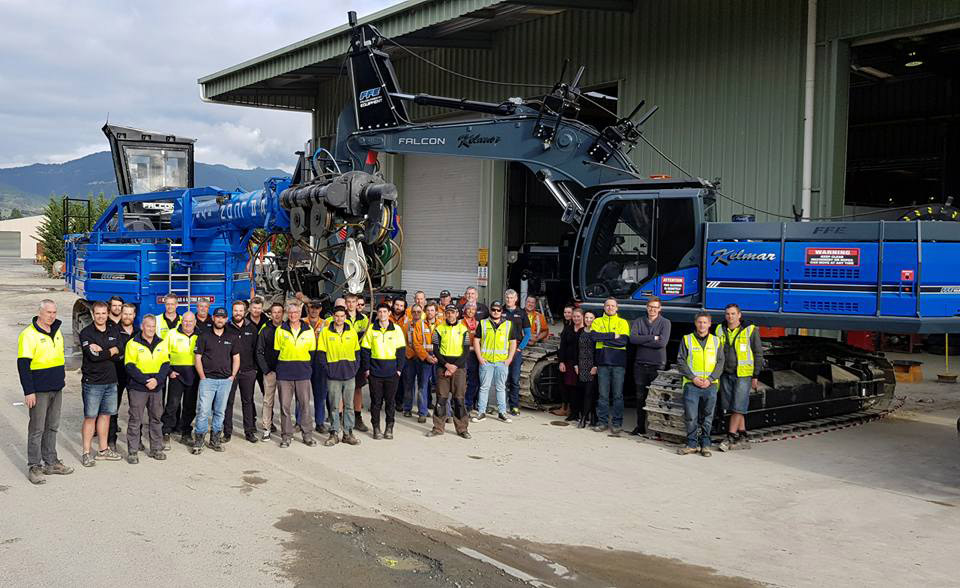
Nelson Tasman is a hotbed for extraordinary business stories, and at Intepeople we are privileged to support so many clever local businesses diversify and grow their teams.
One such business we work with is local forestry equipment manufacturer DC Equipment. They are leading the way globally in creating a safer and more productive steep slope logging industry, from their headquarters and manufacturing facility in Brightwater, and their second manufacturing facility in Santiago, Chile. Recently, we assisted them with the recruitment of a new position in their production team.
We chatted with Andy McKinstry, Manager, and Pedro Ivo Costa Vaz, Production Planner, at DC Equipment, about their recruitment journey with Intepeople and what it’s like to live, work and run a global business in Nelson Tasman.
A family owned business, DC Equipment is driven by a vision to bring safety and efficiency to the forest industry. Andy describes DC Equipment as an exciting place to work – a relatively young company that is expanding and growing, with a “remarkable set of products that we believe in.”
“We are not PC or a Google/Apple type company,” Andy explains. “Sometimes we swear and get passionate.”
Their team is diverse – made up of design engineers, IT professionals, hands-on mechanics and skilled fitters and welders. With more than 65 people in their Brightwater team alone, they’re regularly producing their current range and developing new products.
Employing a diverse mix of nationalities they also have a high proportion of women working in the business compared to many forestry engineering-based firms.
Andy admits it can be hard to find skilled workers in Nelson, especially with production experience, but feels they “are lucky to have a good group of people involved in the business.”
With DC Equipment’s major export markets being the USA, Canada, Australia and Chile, it’s no surprise that logistics and production planning is a significant aspect of the business.
In 2019, DC Equipment had an opportunity for a Production Planner, and with the ideal candidate for this position requiring a specific set of skills and experience, Andy engaged Intepeople to recruit for this position.
“We have used Intepeople before to fill positions and we have found them to be very thorough and they have been successful in bringing the right people to us,” explains Andy. “They have taken the hassle out of the recruiting process and have had a wider spread of people than traditional advertising.”
One of our clever Talent Partners, Odette, took on the recruitment for this role, which covered our full-service recruitment package from advertising the role and shortlisting applicants, through to initial interviews, reference checking and final face-to-face interviews at DC Equipment’s Brightwater head office.
“I found Intepeople terrific and they kept us involved throughout the process”
- Andy McKinstry, DC Equipment
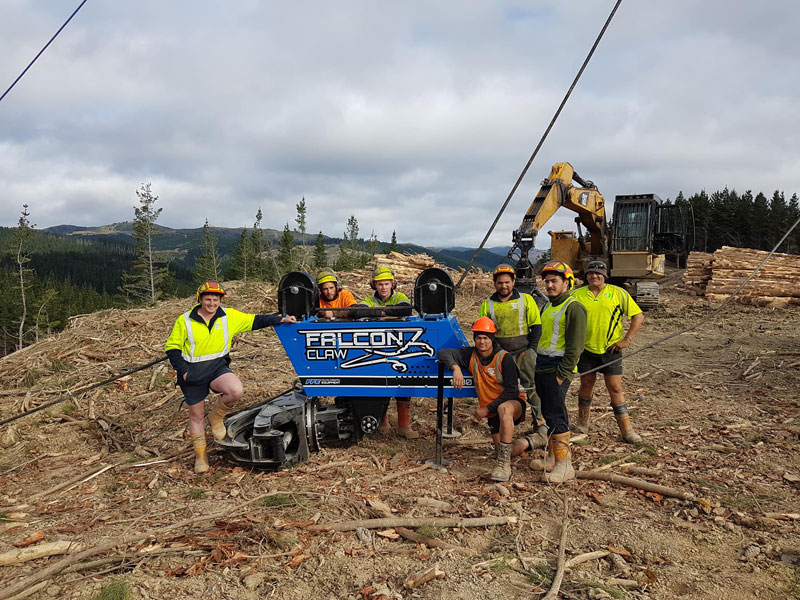
While advertising the role, Odette received an application from Pedro, originally from Brazil and living in Auckland at the time.
Highly educated with a master’s degree in project management, bachelor’s in manufacturing engineering and level 4 in naval machines, Pedro also brought with him more than nine years of extensive hands-on experience in industrial/manufacturing planning and scheduling from the shipbuilding industry.
Keen to enjoy the New Zealand lifestyle, Pedro had spent two years developing his language and professional skills in preparation to successfully work here.
Discovering the Production Planner position with DC Equipment, Pedro felt it was an unmissable opportunity to reengage in a planning role and challenge himself in a new field.
Having originally moved from Brazil to Auckland in 2017, then moving to Nelson in 2019, Pedro admits his new life in Nelson took a little getting used to at first.
“My first week was a little bit difficult – new job, new city, everything was really new,” explains Pedro. “However, DC allowed me time to settle in the city, find a place to stay and all the things that need to be done when you are moving from one city to another.”
Pedro compliments DC Equipment on their comprehensive induction, and support from his colleagues who really helped him to settle in and understand the company’s processes.
“I have never lived in a small town before, but after you start knowing the community and all the different activities you can do, this feeling has gone away,” Pedro says. "Nelson made me feel welcome and has been treating me well so far."
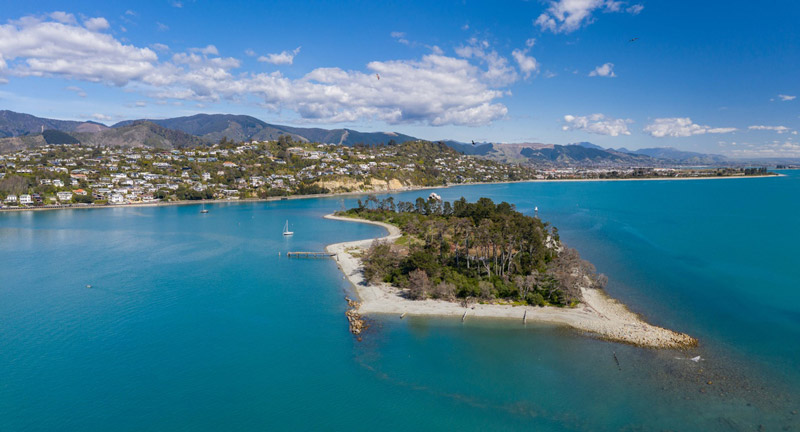
Image credit: NelsonTasman.nz
“Nelson made me feel welcome and has been treating me well so far.”
- Pedro Ivo Costa Vaz, DC Equipment
Keen to live and work in Nelson Tasman? Join our Talent Bank here.
Looking for recruitment services in Nelson Tasman? Contact us here to discuss your needs.
Our fabulous Sourcing Specialist, Amanda Burggraff, shares her story of moving to Nelson Tasman as a young professional.
I grew up in Minnesota; four seasons dramatically changing from lows of -25 c (plus wind chill) to hot, sticky summers (don’t forget the mosquitoes)! Despite this, it’s still a great state with beautiful lakes and friendly people.
It requires a lot of adjusting to each of our four distinctive seasons, but with each of life’s adaptations creates a new wave of possibilities.
The boats come out to play as the ice on the lakes breaks free and the eagerness of anticipation is let loose as a new set of seasonal hobbies arises. Equally, as fall hits, the trees make dramatic streams of colour transitioning the fresh water into its first hard freeze where the kids pull out their ice skates and glide across the smooth and endless rink.
Such adaptations in our lives also prepare us for life’s unpredictable changes; from our uplifting moments to coping with our uncomfortable ones. And of course, we each have our own 'bumps in the road' taking it’s own unexpected turns and corners.
For me, at the age of 16 my diagnosis of Leukemia cancer and proceeding stroke made for a very challenging journey. We don’t often appreciate how great it is to have the strength to stand up, the ability to read a book or to be able to recall your sibling’s names until it’s all swiped away from you. It’s not easy to go backwards with our progress in life - it’s not until later that you are able to reflect and see how much you have actually gained.
After graduation and having been involved in university in every shape and form, things felt a bit boring to just do what I was used to. Teachers were pressuring us to find our ‘big kid jobs’ and although I wanted this too, my plan was also clear – to live and work in a ‘playground.’
It will always be my goal to progress my skills professionally, but it’s also empowering to snowboard epic powder or kitesurf with the most beautiful landscapes. Man, just letting go and jumping off a cliff into a pool of water just feels freeing somehow. I thrived on this thrill and needed to make the leap of living abroad to adapt to a new environment.
But how I was going to get there or where I was to go was part of the unknown journey. I find it’s people in our lives that open us up to new aspirations or lead us to new opportunities.

So that’s what I did. A relationship that started in one country came back together in another and before I knew it I was packing a suitcase to New Zealand. It feels pretty liberating to slim your life’s belongings to what you can carry on your back.
Auckland was an obvious landing pad to adjust to the working culture of New Zealand. Although it is still a western and English speaking country, I was learning British style traditions and giggling when someone asked, “How are you going?” In response I thought.. ‘Hmm… where am I going?’ These adjustments, reminds you how sheltered we can be when sticking to our norm.
Although Auckland has its perks and international presence, the drive to the ‘playgrounds’ was time consuming. For my partner and I, we wanted this ‘playground’ in our background.
The region offers such diverse landscapes and endless activities that we love. The goal was set but how we were going to get there was another puzzle.
We kept a close watch on job advertisements in Nelson. My partner’s eyes lit with excitement one day reading through a job opportunity that aligned with his skills and experience. He was invited for an interview then flown down to Nelson to get a hands-on feel for the new possibility.
I’ll never forget the day he rushed to me and threw his arms around me saying that he received the job offer. Wow, this aspiration was really coming true.
We took a precautious transition for six months, with my partner moving to Nelson first. I stayed back to finish up my work in Auckland and to search for a job in Nelson for myself.
It took a bit of ‘homework’ to keep a close eye on job boards, reaching out to connections and approaching employers directly.
While taking some time off work in Auckland, I flew down to Nelson and I was grateful that Intepeople was happy to meet with me. Earlier I had contacted them and I was pleasantly surprised when they said that an opportunity may be available internally. This was exactly what I was looking for as it closely matched my experience and career goals.
I relocated to Nelson a few months later with a second interview scheduled. The team was lovely and I was happy to be joining Intepeople shortly after.
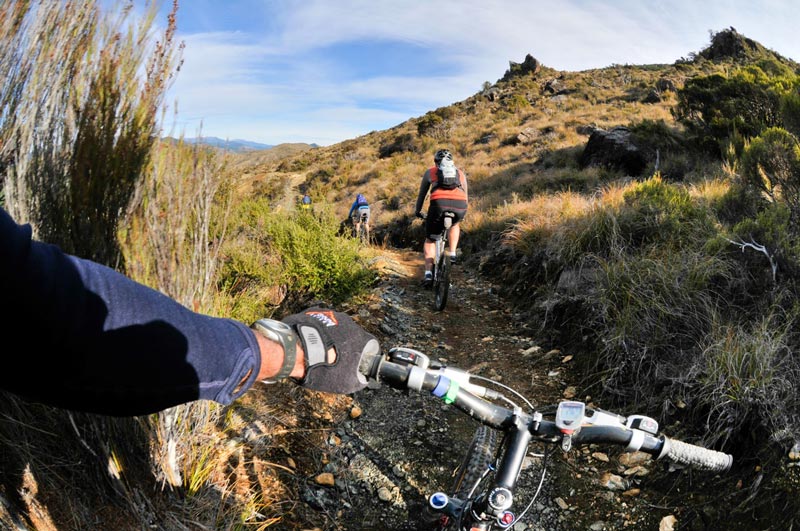
I was enjoying my new job but I remember getting off work and thinking, ‘Where is everyone? Where can I find some friends?’ In Auckland it was easy to connect with others on MeetUp, which offers people the opportunity to meet new people with shared interests in activities, sports or in professional development. This same app in Nelson unfortunately offers few groups at this stage.
A few months after moving to Nelson and onto our third flat share we met a lovely young couple that welcomed us in and connected us to the Nelson Young Professionals (NYP). This was finally the community connection I was looking for – people eager to get out and enjoy activities together while still eager to progress professionally. It’s great to have a like-minded community who wanted to ‘Work, Play, Stay’ in our Nelson Tasman region.
I quickly joined the NYP’s corporate rowing team which was a completely new sport to me and heaps of fun! The monthly social networking evenings broadened my social group and attending the NYP’s Intepeople Speaker Series gave me better insight to our local businesses and leaders in the region.
This winter, I joined NYP’s committee team to help run our team sports and upcoming activities. It’s a great crew of people and fantastic way to bring our young professionals in the region together.
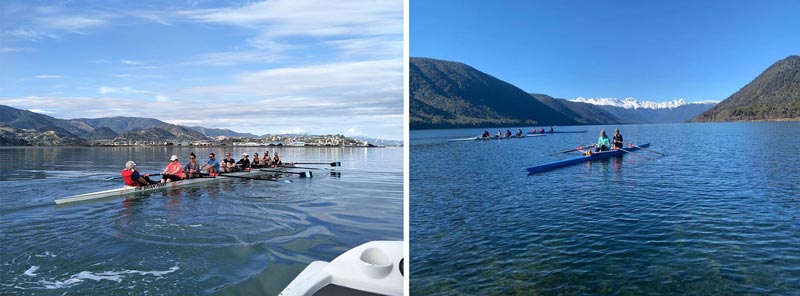
Moving to Nelson was a great choice for us. My partner and I have bought our first home, made many new friends and feel settled in our life here. It offers us the best of both worlds - work opportunities as well as a 'playground' on our doorstep.
Looking back after making large steps like this, you realise how much you've gained and the incredible new relationships you've made. Something I've found important? Taking moments to reflect on the journey and to find the value in even the bumps in the road.
Are you a young professional looking to work, play and stay in the Nelson Tasman region?
Start by registering for our talent bank and joining Nelson Young Professionals.
Sometimes there is more than one way to approach recruitment, such as this innovative ‘win-win’ way one of our recent placements evolved between two collaborative Top of the South companies.
Earlier this year Emily, one of our team of recruitment consultants, facilitated the placement of a Lean Implementation Manager, Tim Ward, into roles at Pic's Peanut Butter and SeaDragon, where Tim's time, senior skillset and expertise is shared by the two companies.
It’s a great example of two businesses thinking cleverly and partnering in an innovative way to access a permanent senior skillset - without a full-time cost outlay.
There is some amazing talent here in the Nelson region that sometimes goes to waste because businesses cannot afford a full-time staff member with certain capabilities. This concept could be very useful for SMEs in the region to harness those skills that are available here.
- Tim Ward, Lean Implementation Manager
Originally, Intepeople began recruiting for a full time Lean Co-ordinator for Pic’s Peanut Butter.
When Emily saw Tim’s application come through she could see he had a very relevant set of skills and experience – albeit at a much more senior level. Despite his skillset being very senior for a Co-ordinator position, she felt it would be valuable for Stuart Macintosh, General Manager of Pic’s Peanut Butter to meet Tim.
It was from this meeting between Stuart and Tim that the idea of splitting the role across two organisations evolved.
We'll let Stuart and Tim tell the story from here...
We were 12 months into implementing Better By Lean at Pic's Peanut Butter and had a vacancy for a lean Co-ordinator/Facilitator to provide the additional resource required to support and guide Lean Improvement initiatives.
When I interviewed Tim I realised that he was an extremely experienced Lean practitioner, and whilst over-qualified for the Co-ordinator position could see he had the experience and capability to add significant value in-house to our Better by Lean implementation.
SeaDragon are at a similar stage to Pic’s and I explored with Nevin Amos, CEO of SeaDragon, the concept of a Lean Implementation Manager job share between the two companies.
As a Lean expert Tim is highly organised and capable of balancing the job share between the two companies - both organisations benefit from his experience and passion for Better by Lean. In addition we also appointed internally a Lean Co-ordinator who reports to Tim.
Successful implementation of Better by Lean is highly correlated to resourcing the programme so that Lean thinking progressively becomes the way we think and do things. The Lean Implementation Manager job share position provides us with an experienced resource in-house.
For SME’s it can be hard to justify the cost of the experienced resource you require on a FTE basis. A job share concept like this makes the step more manageable, particularly in the short-term.
No, I can’t say that it did. I’m a more traditional, loyal, employee-type person who has only worked at a single business at a time! But when this opportunity came up, I was excited about the concept of working with two different companies, and working within two separate cultures. This is particularly because business culture intrigues me, but also working to effect change within existing cultures is something I’ve become reasonably successful in doing.
I’m lucky that it’s made sense to divide my work week in two with a consistent pattern - I’m at Pic’s Monday to Wednesday and at SeaDragon on Thursday and Friday. At both businesses, the role is similar - I’m there to help the various teams get better at what they do. So my days usually consist of meeting with the operational and project teams, identifying what their current problems and issues are, and then coaching the teams in different methods of approaching each of the situations.
I was originally concerned that there might be the need to “swap days” around a bit, leading to frustration around availability, but that hasn’t needed to happen.
Obviously, there is an inescapable need each time to get up to speed with what’s been happening with the teams in my absence, especially in the case of SeaDragon, where essentially I have a “5 day weekend” every week. However, the work structures we’ve put in place allow me to get a good picture early of how things are going and where I can be of most use each week.
Psychologically, it’s been interesting being aware of my “non-work thinking time” - outside normal office hours when I’m thinking about work things. I seem to naturally evenly distribute that processing time, rather than only think about one business or the other.
Firstly, it is an amazing experience. I get a lot out of helping teams develop their work processes, so to be able to do that for teams across two businesses is great.
Second, set in place some simple structures, e.g. regular catch-ups with your managers and the people you work with each week, so you’re able to get a good picture of what your focus needs to be.
Thirdly, work out what your approach will be regarding the divide between the roles. If you’re a good multi-tasker, you may be able to keep up with the emails/communications from both businesses at all times. I’m not so good on that front, so when I’m at each business, I focus entirely on that business for that day.
There is some amazing talent here in the Nelson region that sometimes goes to waste because businesses cannot afford a full-time staff member with certain capabilities. This concept could be very useful for SMEs in the region to harness those skills that are available here.
This successful recruitment initiative highlights the huge potential for more local businesses to 'talent share' in a similar, collaborative way. All it takes is a little thinking outside of the box!
We invite you to discuss recruitment options with our team by contacting us here.